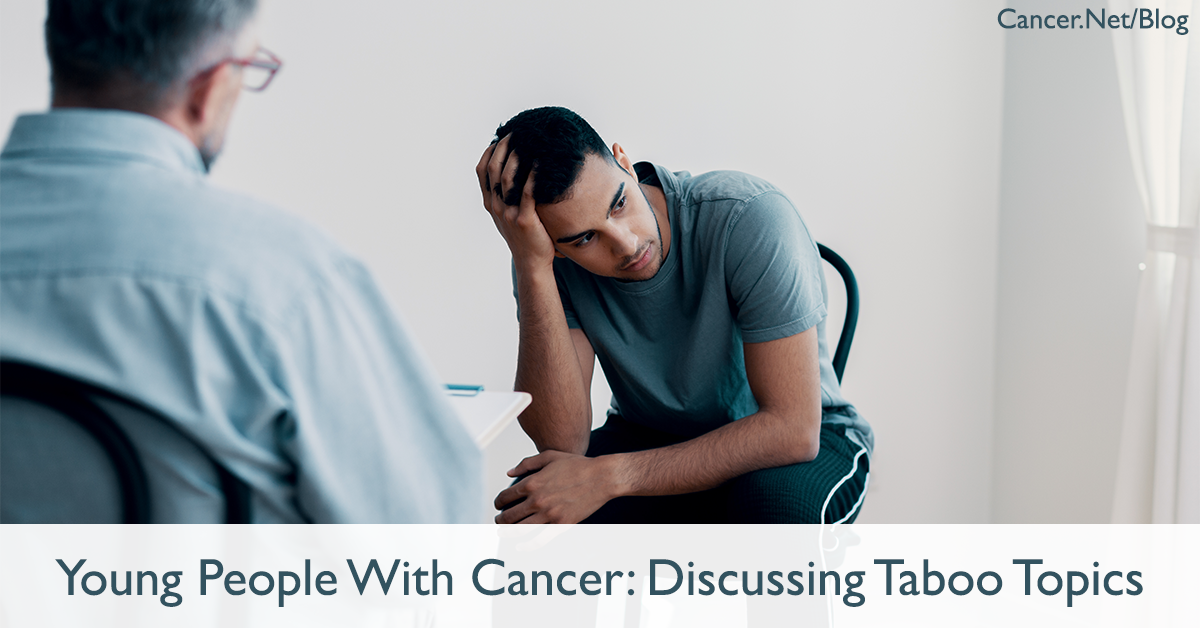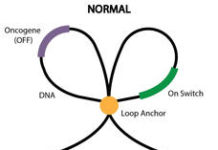
This content is adapted from an ASCO Daily News Podcast, published August 3, 2020. The podcast discusses topics from the ASCO Educational Book article, “Taboo Topics in Adolescent and Young Adult Oncology: Strategies for Managing Challenging but Important Conversations Central to Adolescent and Young Adult Cancer Survivorship.” This conversation has been adapted for length and content.
Teenagers and young adults often face unique challenges when living with or beyond cancer. But for many teenagers and young adults, these challenges may be difficult to discuss, including with their health care team.
In this Q&A, Anne Katz, PhD, RN, FAAN, leads a conversation with Brad Zebrack, PhD, MSW, MPH, on some of the taboo topics that often affect teenagers and young adults with cancer. Dr. Katz is a sexuality counselor and clinical nurse specialist at CancerCare Manitoba. Dr. Zebrack is a specialist in social work oncology at the University of Michigan’s Rogel Cancer Center.
Q: Why is sexual and gender identification important to address for teenagers and young adults with cancer?
Dr. Zebrack: One of the things I really appreciated about the ASCO Educational Book article was that it did touch upon the experience of sexual and gender minorities, an issue that I think has really not been captured so well in the clinical and research literature over the years. One of the aspects of growing up and being a teenager or young adult is about becoming comfortable with yourself, and becoming comfortable with who you are. It’s that notion of identity development. So things like sex, sexuality, sexual identity, and gender identity are evolving and can be fluid and change for young people.
Q: What role does faith and religion play in the lives of young people with cancer?
Dr. Zebrack: My experience and working with teens, young adults, and patients of all ages is that, for many, faith and religion is an asset. It’s something that helps them deal with the adversities of life. And there’s a whole body of literature around, particularly for older adults and especially at the end of life, how being able to rely on faith and rely on religion is really important and really helpful to deal with these adversities.
For young people, it can be different. Because again, just like sex and gender, developing a religious identity and a faith basis is also fluid and changing for young people. I remember once talking to a young woman. She was 25 years old. She was just a couple of years out of treatment for Hodgkin lymphoma. And she was telling me about how growing up, she was very involved in her church youth group and how being part of that youth group was so important, and going to church and having a strong basis and faith in her religion was important. But when cancer hit, it was very disturbing to her, because she found herself questioning her faith in God.
So questioning faith was an existential challenge that she found very distressing. And the fact that she was questioning her faith was doubly distressing to her. So I think that any kind of distress like that for young patients is going to have implications for their ability to cope with the challenges that accompany a cancer diagnosis and its treatment.
Dr. Katz: I think that’s a really good point. And there’s certainly literature that points to the role of faith in women with breast cancer, particularly in women of color, and how friendship and those bonds that are created really helped people through the experience.
Q: Some young people, particularly those who are not living in large metropolitan areas, may be the only young person in their area they know of who has cancer. What would you tell a young person with cancer who feels isolated?
Dr. Zebrack: I know the first thing they’re going to do is go online. And they’re going to use their social media accounts and networks to try and connect with others and find information as well as support. As a health provider, it’s my responsibility to make sure that they, to the best of their ability, can sort through all that information and be able to distinguish which resources and information are helpful and which are potentially harmful.
I think we’re talking about engaging young people in the ability for them to develop some critical thinking, that when they’re online and they’re looking at all these resources to do things like ask, “Well, what’s the source of the information that’s coming at you? Is it a reputable organization?” Because I think that the biggest current concern I have is that they’re going to be out there in that world, and every piece of information is evaluated equally. And we know that that’s not the case, that there are reputable as well as non-reputable sources.
Dr. Katz: Organizations such as Teen Cancer America and Stupid Cancer have done so much for this population in a relatively short time, where individuals can find like-minded people who have been through the same experiences. And so much of the work is done online anyway that this could provide them with a good fit for education, for support, and perhaps even for dating.
Q: Why can it be difficult for some young people to trust their health care providers?
Dr. Zebrack: Particularly for adolescents and young adults, cancer is really rare. So when they start to experience symptoms and they go to see a doctor, oftentimes what these young people experience is, if they’re reporting a pain in their leg, for example, the doctor is not going to obviously jump to the first thing, “Oh, you have cancer.”
So it may be written off as something like growing pains. So what is a common experience among young people is that they’re reporting these symptoms. They’re reporting these conditions. For those who ultimately are diagnosed with cancer, what they’ve now experienced is a number of physicians, a number of health care providers, who have discounted their experience. So that when they’re told that they have cancer, many of them have now developed a distrust of the health care system and a distrust of doctors.
I think we’re also in an era now where we’re really hearing an emergence, particularly from young people of color, that there’s a whole other aspect of experiencing discrimination and racism in institutions, whether it’s health care systems, educational systems, and so on, which makes it doubly imperative for us within the system to reinforce and encourage and build trust with patients.
Dr. Katz: So how do you build trust?
Dr. Zebrack: The first thing that comes to mind is listening; to just sit down and spend some time listening to the concerns of our patients. Given that we may have just given them a cancer diagnosis, I think we just need to then take a breath and step back and let these young patients process this. We need to listen to them about their concerns about what aspects of their life they think are now going to be impacted and where we may be able to provide some support and assistance.
Q: How can cancer impact a young person’s relationships?
Dr. Zebrack: When you think about the relatively few adolescents and young adult patients that’ll be seen in oncology practices compared to many older adults, older people have lived many more years of life. And they’ve had experiences of dealing with adversity. And every time you have an experience of adversity in your life, you learn ways to cope. And then you can apply those learnings to the next time when some other challenge comes up in your life.
But for young people, they haven’t had these experiences and these opportunities to build up a set of coping skills. So when we think about relationships, there’s the proverbial couple walking to the altar and getting married. And it’s like, we’re going to be together until death do us part, right?
I think the young people are thinking, well, the health challenges and death, that’s going to come later. That’s later in life. But when it hits them early in life, they really lack the coping skills, the ability to communicate within a couple. Oftentimes, young people can benefit from some outside support, some outside experience to help them negotiate those relationships.
Q: What are some of the other big challenges teenagers and young adults with cancer face?
Dr. Zebrack: One of the reasons I so appreciated the ASCO Educational Book article was because it was really elevating issues of sex, money, and death. Whether we want to talk with young patients about this or not, these things are on their mind. It does take a community to address these aspects of cancer that are not just physical, but they’re psychological. They’re social. They’re faith-based. They’re existential. Young people are thinking about sex, death, and all these things, whether we ask them about it or not.
Dr. Katz: I think further to your point about needing a community, a village, a city to support these young people is also recognizing that for the younger patient, their family needs support. I can imagine nothing worse than being the parent of an adolescent or young adult who has cancer. It is more than life altering, right? It turns our ideas of how life is going to go completely on its head. And then for the young adult who’s a little bit older, let’s think about their partner and what they go through when often they are really ill-equipped to deal with these kinds of issues. Our patients are a village in and of themselves, and we need to include their supports.
Dr. Katz and Dr. Zebrack have no relationships to disclose that are related to the issues discussed in this Q&A.





